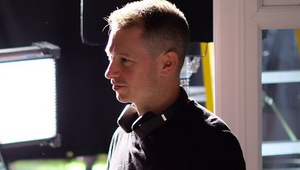
David Edwards’ Hands-On Road to Direction

Film has always been tied up with family for director David Edwards, ever since his dad showed him The Godfather when he was a boy. “I was way too young to be watching this film, much to my mum’s disgust,” he laughs. But it hasn’t done him any emotional harm that I can detect, sitting in Another Film Company’s airy office in Fitzrovia, London, having a pleasant chat over a bowl of summer fruit. “I remember that art of storytelling and family coming through the film. I have a very close family, brought up with strong family ties. That was important to my dad, I think. Looking back at that it’s still probably my favourite film of all time.”
It was this sense of family that motivated David to sign to Another’s roster in April. “I wanted to go to a smaller company really focused on pushing directors’ careers,” he says. Having been represented by several production companies over the years he’s learnt what his priorities are. “All the production companies I’ve been to have been amazingly supportive, helped me develop and gave me a buffer and things to do. No one says this is how you direct. You sort of just work out your way of giving your opinion, which is what you’re paid for. You work out a process which you refine more and more. There’s places that I hate shooting and will avoid at all cost. It affects the language of what you make.”
Everywhere he’s been has left a mark. When he was at Rattling Stick, director Ringan Ledwidge served as “a bit of a mentor” to him, always there to offer an opinion or feedback. “I’d grown up watching a lot of the work that he did. Ringan was - and still is, moving on [from Rattling Stick] - a good mate and he’s not a bad person to lean on for advice,” he says.
David’s generally quite aware of the extraordinary film expertise he’s ended up surrounded by. “I’m very lucky to work with a lot of good DPs that cross into doing a lot of feature stuff and have such a wealth of knowledge that it would be stupid not to try and pick their brains from every given angle.”
It’s taken a while for him to accumulate this film know-how. To begin with all he had was passion. Reading was “quite a tricky thing” as a kid so he’d rather watch a film. It was always films, too, because his parents had got rid of their television, replacing it with a monitor and video player, “which was a weird thing to do,” says David. “I remember going to Blockbuster and just getting stacks of films. So everything I watched was the length of a film. It was all a three part structure - beginning, middle and end. We watched some crap films. I remember getting Rambo out once and my mum saying ‘you’re not watching this crap!’”
It was always watching rather than making films though. “I didn’t run around with a Super 8 camera and all that, in the forest,” he says.
By the time he hit his teenage years, David wasn’t getting on too well at school. “I was doing my GCSEs and really struggling. I got into a bad crowd at school. All that sort of thing,” he says. But his art teacher could see the promise in him. “I just loved art and making things. I’m a project person. I like to do things and finish them, to see the end. I think I loved art when I was growing up for that reason. My art teacher took me out the class and said ‘you could do really well at this’. I remember her walking me round the playground saying ‘if you don’t, you could piss this all away.’”
It was a successful pep talk. David threw himself into his art. From there he got A-levels, and got accepted onto an art foundation course, which was the next step in his love affair with image making.
“I did these nude photos of this weird bald guy in all these weird postures,” he remembers. “We shot it on a Hasselblad. Then we printed them a metre and a half by a metre and a half in the dark room. I remember pinning it up. Seeing those images come to life was a real moment.”
He still hadn’t considered directing or filmmaking at all. He went to art school in Leeds – 200 miles from his family home in North-West London, where he dabbled in various media while living downstairs from Ricky Wilson, who would end up as the Kaiser Chiefs’ frontman. “I was quite wild. It was a long way from home so I had a lot of freedom.”
After all his training in the arts, David nearly ended up as a barman. After graduating he got a job as a mixologist, working for ex-footballer Lee Chapman and actress Leslie Ash at their private members club, “making cocktails for the Leeds football team and the cast of Emmerdale.”
David was quite happy with his bartending career, until an older colleague jokingly gave him the sack, telling him he needed to make sure he wasn’t wasting his creative talents in a bar in 15 years’ time.
Only then did he start his career in filmmaking, taking a job at the broadcast network Flextech (now Virgin Media) as a promo producer. Suddenly he was back in his element, creating promos for the networks’ shows. While his friends were doing £10,000 music videos he had £50,000 to make an in-house film. “The work wasn’t always as sexy as the new band, but I was given the opportunity to just make stuff,” he says. “And that was my background in art school - to just make stuff.”
He took to it instantly. “I remember in the first few weeks going to a shoot, seeing someone direct and thinking I could do a much better job than that - as you do when you’re fresh out of uni, thinking that you’re brilliant.”
Although he didn’t know it, it was the perfect training ground for a young director, rapidly pitching ideas to the creative director and the channel head, then going out and shooting.
Soon he was working with some pretty serious talent, rapidly developing his directing style. A highlight was a promo he made for a show called The Unit, starring Robert Patrick and written by David Mamet. He remembers setting up in this studio in Warner Bros in Los Angeles. David Mamet walked in and asked David to take him through his idea. “I’m sat there, this promo producer, talking to David Mamet about how I’m going to represent his show. I remember that being quite a moment, working with that level of actor that you don’t have to try and force this performance out of. They just do it and you tweak things. I suppose that’s what I love most. High visual stuff, but it’s all about working with performance.”
His training soon paid off when he made a spec ad for adidas, which Shots picked up, marking him as a new director to watch and earning him representation at his first production company, Hanrahan.
The commercial work started coming in and David started carving out his style as a director in his own right. Looking at his work in recent years, it’s clear to see his passion for eliciting performance.
David’s video for the Rudimental track ‘Powerless’ was a particular high point, challenging though it proved to be. “It was such gruelling work,” he says. “We were in a polar vortex in New York. It was minus 20 degrees [Celsius]. It was unbelievably cold. I got hideous flu the day before we were shooting. My DP came over from LA and I just remember being sat in my bedroom shaking. And just literally dragged myself around the streets. I’d do a shot, get back in the van and just huddle up in the back feeding myself medication. But fighting it through to the end and the outcome of that is something that I love.”
Another gruelling project was his recent Asylum Aid film, which he put months of work into researching and writing with the creatives at Red Brick Road, developing the script by trawling through hours of real asylum interview transcripts. “There was a lot of work to be done to make sure it was right, tonally,” he says. “It was draining. You become a bit numb to these things because you’re reading so much of it. But when you speak to the charity and these people who have to go through this it’s a lot more real.”
Harrowing subject matter aside, it was exactly the kind of project David loves - taking time over a project and working with actors. And you can tell he was in his element making it when you see the craft that’s gone into the final cut.
On the other hand, David’s keen to avoid only shooting a certain kind of script. He also loved making a trailer for the BBC’s Blue Planet last year, which is a completely different kind of project - “just fish tanks in Greenford, playing with cameras and having two days just to mess around and create effects. It was solely visual. With commercials you get pigeonholed. I’d like to try and resist that.”










